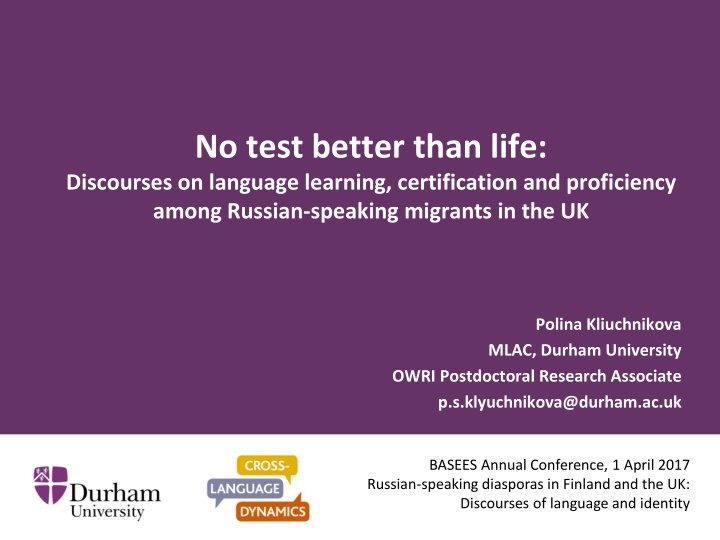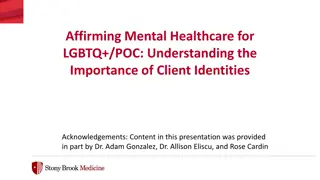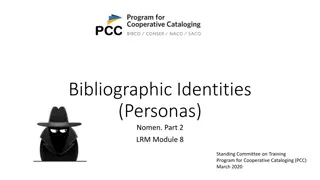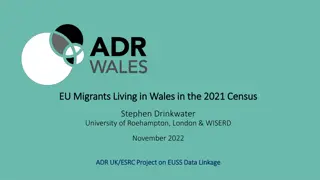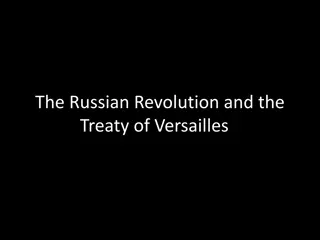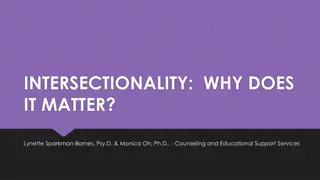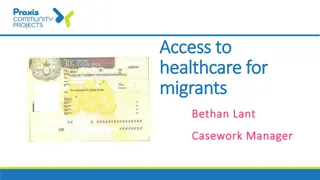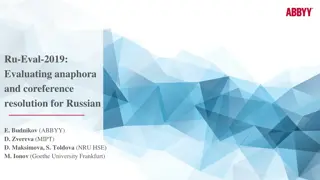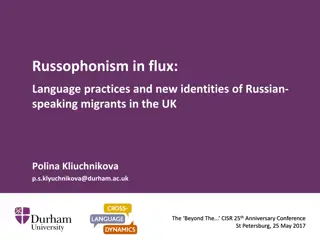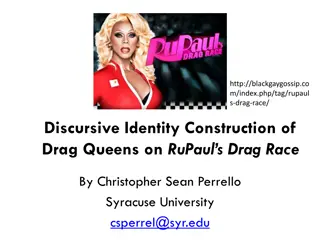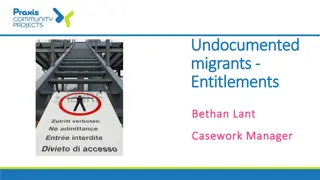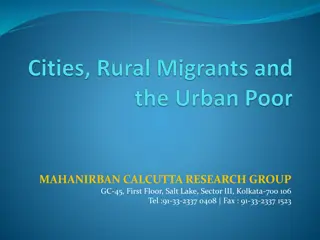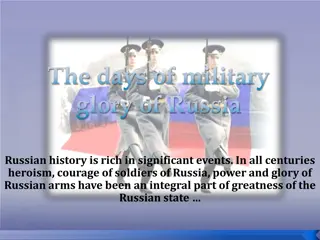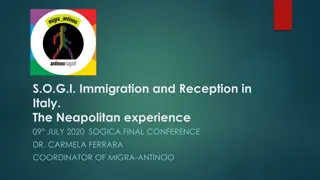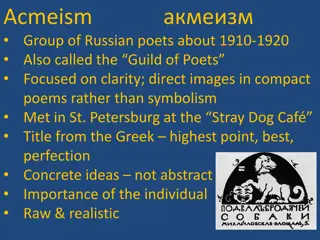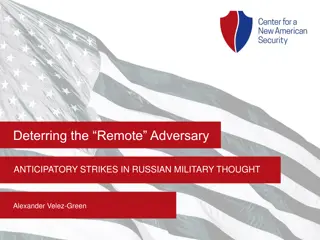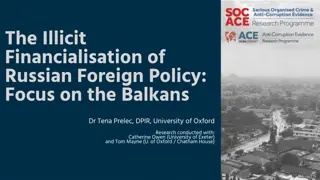Language Learning Experiences and Identities Among Russian-Speaking Migrants in the UK
Examining the language learning journey, certification challenges, and proficiency experiences of Russian-speaking migrants in the UK through personal narratives. The study highlights the social context of language acquisition, the impact of educational background, and the pragmatic strategies used for communication in a new linguistic environment.
Download Presentation

Please find below an Image/Link to download the presentation.
The content on the website is provided AS IS for your information and personal use only. It may not be sold, licensed, or shared on other websites without obtaining consent from the author.If you encounter any issues during the download, it is possible that the publisher has removed the file from their server.
You are allowed to download the files provided on this website for personal or commercial use, subject to the condition that they are used lawfully. All files are the property of their respective owners.
The content on the website is provided AS IS for your information and personal use only. It may not be sold, licensed, or shared on other websites without obtaining consent from the author.
E N D
Presentation Transcript
No test better than life: Discourses on language learning, certification and proficiency among Russian-speaking migrants in the UK Polina Kliuchnikova MLAC, Durham University OWRI Postdoctoral Research Associate p.s.klyuchnikova@durham.ac.uk BASEES Annual Conference, 1 April 2017 Russian-speaking diasporas in Finland and the UK: Discourses of language and identity
Language-centred areas of migrant experiences (1) Language learning/acquisition as socially contextualized transmission of knowledge Vs. (2) Language certification/assessment as a means of demonstrating /observing hierarchy and normalizing judgement
(1) Language learning loop: It was forever until it was no more As I learned the language in this very school with this very teacher, I was able to communicate only with those who learnt English at the same school and with the same teacher. (026-F-33-NCL) Now I have a feeling I had been learning it for all my life then starting from the first grade. But what exactly did we do, what did we study there? There were regular classes, tests. I don t know. (005-F-26-BLT) I was very successful at school, one of the top students in my class. English was one of the subjects I did particularly well at. Do you think it helped me when moving to the UK? [laughing] (010-F-28-NCL) At the moment of moving to England my English was at quite an average level, a school level I could understand very little, and learnt English already here, in England. (023-M-29-NCL)
(1) Personal adventures I had a friend who had BBC at home we spent whole evenings listening to it. Parents thought we were a bit crazy. I still remember some of those voices. [Q. - Are they still in your head now?] Oh yes! (017-F-37-DHM) At school, we used to go to the Red Square to trace some foreigners there. Just for some blah-blah in English. (http://moscowlondon.livejournal.com/) And then there came these guys, from some religious sect. They looked creepy in their white shirts and black ties every weather, every day. But you could speak English to them for free! And they had some free hot chocolate as well. (003-F-28-NCL) These courses were not working [for me]. . And then I met my future husband, I could not speak any English at all, so for our first dates I would bring a dictionary in my purse. We translated every sentence with it. (018-F-27-NCL)
(1) Self-estimation on moving to the UK Pragmatics: school non-skills vs. ESOL-exam survival kit who needs me here with my reading and translating with a dictionary (006-M-26-NCL) IELTS taught me how to write essays, really. I survived on the skill all my time at the Master s programme [at the university] and then [when] I started looking for a job. (005-F-26-BLT) Sociocultural background: strong, but somewhat ideological/outdated/romanticised knowledge of the country: When I first came to London, I found out that I knew the city quite well. Many years of grinding the texts about London is the capital and favourite places of Lenin, Marx and Engels in London left quite a trace in me. (http://froken-bock.livejournal.com/) Well, I signed them the Russian way, you know wishing you happiness, health, success in all your endeavours, eternal love etc Spent tons of time there, and then I got to know that here they just write from M. and that is it. Everyone must have thought I was a lunatic. (039-F-31-LND) Discourse: A postcard trouble
(2) Language certification as gate-keeping A. Blackledge (2009): A doxa, an uncontested point of view that language tests are required to deal with the perceived threat to social cohesion posed by immigrant B. Byrne (2014): Technology of reassurance, not only restricting access to citizenship but also making a public statement of placing a high bar on inclusion E. Shohamy (2013): Messages of superiority and priority of the national language and cultures in the transnational contexts along with negation of languages and cultures which immigrants bring with them from home countries
(2) Language certification as gate-keeping 1. Entering the country: Investment rather than motivation I don t know, I didn t have any problems with passing the test. Probably because I really immersed myself in this for a couple of months, was thinking about it all the time, every new thing I knew those days was potentially important I could use it somewhere. (034-F-26-DRL) 2. Irrelevance of ESOL training for Russian-speaking migrants: No particular aspect during the course was difficult for me I struggle more with communicating in real life! There are these specially trained people at the courses, they are used to it. But then!... I am just confused [uses in Eng.] and that s it. (018-F-27-NCL) 3. Life in the UK /extra language test as reminiscence about past practices: It was not difficult at all on the contrary, I felt I was doing something I am quite used to. A large mass of data, facts totally irrelevant in my real life, weird tasks no one would think of asking me ever. (005-F-26-BLT)
THANK YOU! Polina Kliuchnikova p.s.klyuchnikova@durham.ac.uk
